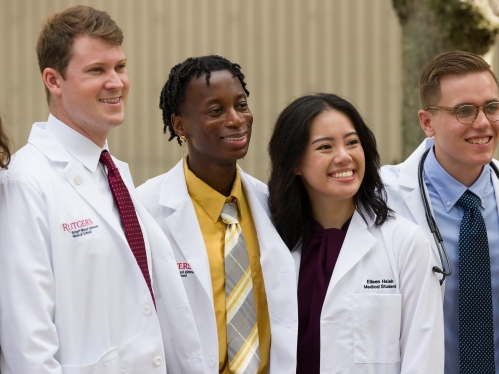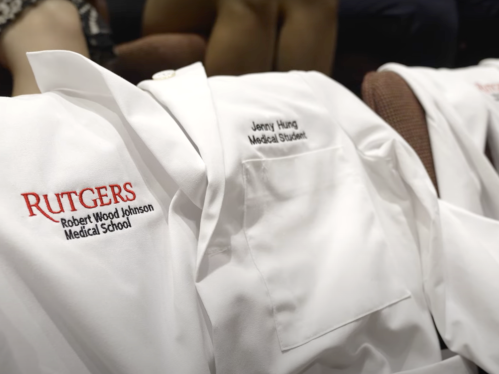Gastroenterology Fellowship
GOALS/MISSON
Welcome to Rutgers Robert Wood Johnson Medical School’s Gastroenterology Fellowship program. Our overall goal is to prepare our fellows to be competent and caring physicians who have the skills of lifelong learning necessary to incorporate new knowledge and methods into their practice of gastroenterology and hepatology and to adapt to a changing professional environment. The fellowship motto is simple: Excellence in Patient Care & Professionalism, Every Patient, Every Time.
CLINICAL TRAINING
The Rutgers Robert Wood Johnson Medical School (RWJMS) Gastroenterology Fellowship is an ACGME accredited program where fellows are exposed to a large diversity of cases through our clinical sites. The Robert Wood Johnson University Hospital (RWJUH) is the primary affiliate and clinical site. State-of-the-art clinical, laboratory, endoscopic and medical records facilities are present. A diverse patient population of all ethnicities, ages & gender is available for the fellow to have experience with a variety of clinical problems and stages of disease. Fellows also have the opportunity to rotate at University Hospital/New Jersey Medical School in Newark, and the Veterans Affairs Health System in West Orange and Lyons, NJ.
Fellows have appropriate supervised experience to develop skills in providing consultative services and communicating with physicians and other members of the health care team and being a professional advocate for the patient within the healthcare system. Skilled faculty preceptors supervise each fellow during performance of all procedures and a procedure log is maintained by each fellow. Instruction is provided on the indications, contraindications, and techniques of diagnostic and therapeutic procedures, complications, limitations, interpretation of endoscopic appearance.
In recognition of the importance of outpatient medicine to the practice of gastroenterology, all fellows spend at least one half day per week for the entire 3-year period in an ambulatory care clinic in which both new and continuity care patients with gastroenterological diseases are evaluated and managed.
EDUCATION
The fellowship program curriculum provides the opportunity for trainees to achieve cognitive knowledge and procedural skills, develop interpersonal skills, professionalism, cultivate humanistic attitudes, ethical behaviors and gain supervised practical experience as a consultant in treating a wide range of clinical problems- acute and chronic- in varied patient populations (different ethnicities, age groups, socioeconomic and cultural backgrounds).
Fellows have ready access to specialty-specific and other appropriate reference material in print or electronic format through the Rutgers University Libraries. Electronic medical literature databases with search capabilities are be available from any location.
Didactic Conferences are held on a regular basis and all fellows participate actively in the planning and participation of these conferences. Clinical conferences include GI tumor board, liver tumor board, mortality and morbidity conference, board review and GI pathology conference. Additionally these are also multidisciplinary and attended by gastroenterologists, surgeons, oncologists, radiologists and pathologists.
RESEARCH
The Division of Gastroenterology & Hepatology, and the Department of Medicine are committed to providing the best overall learning experience and to create an environment conducive to inquiry. Research and scholarly activity are very important aspects of the fellowship as well. Fellows receive mentorship through faculty in their area of interest, who help them achieve their targets. Fellows are given extensive time for research during research rotations despite their rigorous clinical training at this time. To facilitate their efforts, the Program Director and the Division will provide the necessary technological and educational tools.
RECENT CHANGES
The recent recruitment of renowned, technically-skilled and dedicated faculty over the past three years has contributed towards strengthening the academic and clinical success of the division, and giving the fellowship training an excellent educational and learning experience. The GI fellowship program had expanded to include a total of 3 incoming fellows beginning in the academic year 2019/2020. Our division also has a one-year Hepatology Fellowship (non-transplant) and a one-year Advanced Inflammatory Bowel Diseases Fellowship.
Educational Curriculum
-
The Gastroenterology Fellowship program is a three-year program that provides the opportunity for trainees to achieve cognitive knowledge and procedural skills, develop interpersonal skills, professionalism, cultivate humanistic attitudes, ethical behaviors and gain supervised practical experience as a consultant in treating a wide range of clinical problems- acute and chronic- in varied patient populations (different ethnicities, age groups, socioeconomic and cultural backgrounds). During the three-year fellowship, clinical and research experience will be spent at the principal affiliate and sponsoring institution Robert Wood Johnson Medical School/RWJ University Hospital, with dedicated clinical rotations at the University Hospital/Rutgers New Jersey Medical School (NJMS) and the Veterans Affairs Health Care System. Fellows also actively participate in student and resident training.
Educational conferences are held on a regular basis and all fellows participate actively in the planning and participation of these conferences.
-
CLINICAL SITES:
The Rutgers Robert Wood Johnson Medical School (RWJMS) Gastroenterology Fellowship is an ACGME accredited program where fellows are exposed to a large diversity of cases through our clinical sites.
Rutgers Robert Wood Johnson University Hospital (RWJUH)
RWJMS is the sponsoring institution for the fellowship program. Located in New Brunswick, RWJUH is the principal affiliate and clinical site. This is a large 600-bed tertiary level university hospital, and is recognized as one of New Jersey’s premier academic medical centers. The Division of Gastroenterology & Hepatology is staffed by nine full-time faculty with significant expertise in various GI and liver disorders, and provide education and training to the fellowship program. Rotations include General GI and Hepatology consult service, IBD outpatient service, Advanced/Biliary consult service and Ambulatory Practice.
University Hospital via Rutgers New Jersey Medical School (NJMS)
Fellows rotate here during their 2nd and 3rd year where they receive training in advanced liver diseases and liver transplantation. Located in Newark, University Hospital is a large academic center that harbors the first liver transplant center in New Jersey. The Center for Advanced Liver Diseases and Transplantation provides advanced liver disease management and pre/post-liver transplant care.
VA New Jersey Health Care System
Fellows receive ambulatory clinic experience and endoscopic procedural training through outpatient endoscopies at their specialized ambulatory procedure units.
CALENDAR OF ROTATIONS:
Fellowship training encompasses the following rotations:
General GI Consult Service (RWJUH)IBD Outpatient Service & Endoscopy (RWJUH)
Interventional/Advanced/Biliary Consult Service (RWJUH)
Hepatology Inpatient and Outpatient Service (RWJUH)
Transplant Hepatology Service (UH, Newark)
Research (RWJUH)
Ambulatory Practice – Continuity Clinics (RWJUH)
VA Rotation (West Orange/Lyons, VA)
Electives (RWJUH)
All fellows are required to rotate on every rotation so that they are provided with comprehensive exposure to all aspects of gastroenterology and hepatology. For fellows who enter the program with a well-defined interest in a particular area, attempts are made to expose the fellow to that field as early in their training as possible. The only exception is Interventional/Advanced Consult Service, wherein fellows are required to perform at least one year of standard endoscopy training before embarking on more advanced procedures.
-
EXPERIENCE
Fellows are given extensive time for research during research rotations despite their rigorous clinical training at this time. The research rotation will be protected time. Fellows must declare one or more research interests, which they will have time to discover during their first year. By second year, they are expected to establish a research focus, design a project, identify a mentor and initiate their research project. These projects may include basic science or clinical research. The main focus of this rotation is to develop research skills that can be applied within a highly academic setting, resulting in a quality publication at the end. The fellows are encouraged to actively participate in research activities and present their findings at a national meeting.
OPPORTUNITIES
Every fellow is expected to identify a mentor and project(s), and initiate meetings with potential mentors and others participating in their research. Fellows then meet regularly with their research mentor through the course of their study. Every fellow is also expected to complete at least one quality improvement project over the course of their fellowship. If they choose, they may lead this project with a team including but not limited to medicine residents and students. Their quality improvement project should be conceptualized by the end of first year. Updates on this project will need to be provided during each semi-annual Program Director evaluation.
Fellows are also expected to submit research to one or more of the four main digestive diseases conferences each year. As a first author, they will present this research at the conferences. While attending these conferences, they will participate in other scheduled lectures, courses and conferences, and present this updated research during didactic sessions. Fellows may also choose to participate in other research activities including writing book chapters, manuscript reviews and invited research submissions
-
- Completion and passing of all three USMLE steps
- ABIM board certified or board eligible
- The accepted applicant must obtain a full NJ license (limited license if on visa)
- A valid ECFMG certificate for all foreign medical graduates
- Completion of a prior internal medicine residency is required
-
Meghana Ghattu, MD
Fellowship Year 1
Medical School: Frank H. Netter MD School of Medicine at Quinnipiac University
Residency: Abbott-Northwestern Hospital Program
Fellowship: Rutgers Robert Wood Johnson Medical School Hepatology
Ankoor H. Patel, MD
Fellowship Year 1
Medical School: New York Medical College
Residency: Rutgers Robert Wood Johnson Medical School
Naveen Mallangada, MD
Fellowship Year 1
Medical School: Stony Brook School of Medicine
Residency: Rutgers Robert Wood Johnson Medical SchoolSophia Pimpinelli, MD
Fellowship Year 1
Medical School: Sidney Kimmel Medical College at Thomas Jefferson University
Residency: Rutgers Robert Wood Johnson Medical School
Toni Marie Chandler, MD
Fellowship Year 2
Medical School: Virginia Commonwealth University School of Medicine
Residency: Atlantic Health (Morristown)
Fellowship: Rutgers Robert Wood Johnson Medical School Hepatology
Brenda French, MD
Fellowship Year 2
Medical School: Sidney Kimmel Medical College at Thomas Jefferson University
Residency: Thomas Jefferson University Hospital
Lauren Lally, MD
Fellowship Year 2
Medical School: Cooper Medical School of Rowan University
Residency: Thomas Jefferson University Hospital
Samuel Jo, MD
Fellowship Year 2
Medical School: Jacobs School of Medicine and Biomedical Sciences, University at Buffalo
Residency: Rutgers Robert Wood Johnson Medical School
Ping He, MD, PhD
Fellowship Year 3
Medical School: Stony Brook University Health Sciences Center School of Medicine
Residency: Rutgers Robert Wood Johnson Medical School
Scott Ventre, DO
Fellowship Year 3 – Chief
Medical School: Rowan University School of Osteopathic Medicine
Residency: Rutgers Robert Wood Johnson Medical School
Justin Zhuo, MD
Fellowship Year 3
Medical School: Duke University School of Medicine
Residency: Stanford Health Care-Sponsored Stanford University
Advanced Inflammatory Bowel Disease Fellow 2024 – 2025
Briette Karanfilian, MD
Fellowship Year 1- PGY 7
Medical School: Rutgers Robert Wood Johnson Medical School
Residency: Rutgers Robert Wood Johnson Medical School
Fellowship: Rutgers Robert Wood Johnson Medical School Gastroenterology
-
Faculty Listing needed
Salaries and Benefits
The Endocrinology Fellowship offers a uniform package of benefits consistent with those provided at all graduate medical educational programs operated by the medical school. Full details are continuously updated by the Office of Graduate Medical Education.

Contact Us
Ms. Alicia Marty
Department of Medicine
Fellowship Program Coordinator
alicia.marty@rwjms.rutgers.edu.

